
CENTAURUS
Scope & Guideline
Advancing Scholarly Discourse in the History of Science
Introduction
Aims and Scopes
- History of Science and Technology:
The journal emphasizes the historical development of scientific disciplines, technologies, and methodologies, providing insights into how historical contexts influenced scientific advancements. - Cultural Contexts of Science:
CENTAURUS addresses the cultural implications of scientific developments, exploring how science interacts with societal norms, politics, and ethics. - Interdisciplinary Approaches:
The journal promotes interdisciplinary research, drawing from history, sociology, anthropology, and philosophy to provide a comprehensive understanding of scientific practices. - Museum Studies and Collections:
There is a focus on the role of museums and collections in the preservation and presentation of scientific knowledge, including the study of artifacts and their meanings in historical contexts. - Epidemiology and Public Health:
CENTAURUS frequently publishes research on the history of epidemics, public health policies, and the societal responses to health crises, reflecting its commitment to understanding the implications of science on human health.
Trending and Emerging
- Climate Science and Policy:
There is a growing emphasis on the intersection of climate science, politics, and societal implications, reflecting the urgent need to address climate change and its historical context. - Materiality and Object Studies:
Research focusing on the material aspects of scientific objects, including their roles in knowledge production and collection practices, has gained importance, indicating a trend towards understanding science through its tangible artifacts. - Gender and Science:
An increasing number of publications explore the role of gender in the history of science, addressing issues of representation, contribution, and the impact of gendered perspectives on scientific practices. - Epidemiology and Historical Analysis:
The journal has seen a surge in studies examining the historical context of epidemics, public health responses, and the societal implications of disease, particularly in light of recent global health crises. - Science and Technology Studies (STS):
There is an emerging interest in the field of Science and Technology Studies, exploring the relationship between science, technology, and society, and how this interplay shapes knowledge production.
Declining or Waning
- Classical Scientific Theories:
There has been a noticeable decline in papers focusing on classical scientific theories and their historical interpretations, as the journal pivots towards more contemporary issues and interdisciplinary studies. - Traditional Narratives of Scientific Progress:
Research centered on linear narratives of scientific progress has diminished, with a shift towards more complex, nuanced views of scientific development that include social and cultural dimensions. - Regional Studies in Isolation:
Papers that focus solely on regional studies without connecting them to broader global contexts are becoming less frequent, as the journal increasingly favors research that demonstrates interconnectedness in scientific developments.
Similar Journals
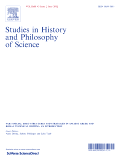
STUDIES IN HISTORY AND PHILOSOPHY OF SCIENCE
Unraveling the Philosophical Threads of Scientific EvolutionSTUDIES IN HISTORY AND PHILOSOPHY OF SCIENCE, published by Elsevier Science Ltd, is a leading academic journal dedicated to the exploration of historical and philosophical dimensions of science. With both an ISSN of 0039-3681 and E-ISSN of 1879-2510, this esteemed journal has established itself as a pivotal resource since its inception in 1970 and continues to publish cutting-edge research reflecting the evolution of scientific thought. Situated in the United Kingdom, it is recognized for its high-impact contributions, boasting a Q1 ranking in both History and History and Philosophy of Science categories as of 2023. Researchers in the humanities will benefit from the journal’s rigorous analysis and insightful discussions, as evidenced by its competitive Scopus rankings—placing it in the 96th and 83rd percentiles in their respective fields. Although not an open-access journal, it maintains a commitment to scholarly excellence, aiming to foster a deeper understanding of the interconnections between historical context and philosophical inquiry in the scientific domain, making it an invaluable resource for students, professionals, and researchers alike.
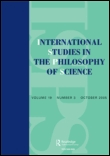
International Studies in the Philosophy of Science
Fostering interdisciplinary debates in the philosophy of science.International Studies in the Philosophy of Science is a distinguished journal published by Routledge Journals, Taylor & Francis Ltd, dedicated to advancing scholarly dialogue in the intersecting realms of philosophy and science. With an ISSN of 0269-8595 and an E-ISSN of 1469-9281, this journal offers a carefully curated collection of research articles, reviews, and discussions that explore critical philosophical questions related to scientific methods, theories, and ethics. Although coverage for the journal in Scopus has been discontinued since 2017, it still maintains a respectable position with a rank of #75 out of 140 in the Arts and Humanities category, showcasing its relevance within the field. While it currently does not offer open access, the journal continues to be an essential resource for researchers, professionals, and students seeking to deepen their understanding of the philosophical underpinnings that inform scientific inquiry. By putting a spotlight on interdisciplinary approaches and fostering robust academic debate, International Studies in the Philosophy of Science plays a vital role in shaping the future discourse in the philosophy of science.
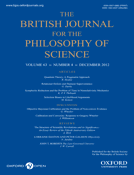
BRITISH JOURNAL FOR THE PHILOSOPHY OF SCIENCE
Pioneering Discussions at the Intersection of KnowledgeThe British Journal for the Philosophy of Science, published by University of Chicago Press, stands as a leading journal in the fields of philosophy and history of science. With its ISSN 0007-0882 and E-ISSN 1464-3537, this esteemed publication has been pivotal in advancing philosophical discussions surrounding scientific practice since its inception in 1950. Covering a diverse range of topics and critical analyses, it holds an impressive track record within the academic community, consistently achieving Q1 rankings across several categories, including History, Philosophy, and History and Philosophy of Science. With a Scopus rank placing it in the top percentiles of its respective fields, the journal is recognized not only for its academic rigor but also for its role in shaping contemporary philosophical discourse. While it is not an open-access journal, the British Journal for the Philosophy of Science provides essential insights and fosters critical thinking, making it an indispensable resource for researchers, professionals, and students dedicated to the nuanced interplay between science and philosophy.

Nuncius-Journal of the History of Science
Connecting Science with Its Historical TapestryNuncius - Journal of the History of Science, published by BRILL, is a vital resource dedicated to the exploration and analysis of the intricate relationship between science and its historical context. Established with the goal of fostering scholarly discussion, this journal serves as a platform for researchers and historians to present their findings and interpretations regarding the evolution of scientific thought. With an impact factor reflective of its academic rigor and ranked in the Q3 category in the field of History and Philosophy of Science, it offers a rich archive of articles spanning converged years from 1986 to 2024. Nuncius encourages submissions that advance the understanding of science's impact on society, culture, and its philosophical underpinnings, making it a key reference for those engaged in the histories that define modern scientific inquiry. Situated in the scholarly landscape of the Netherlands, Nuncius remains an essential read for professionals, students, and academics seeking to deepen their knowledge in this significant field.

HISTORY OF SCIENCE
Charting the Course of Scientific Thought Through TimeHISTORY OF SCIENCE, published by SAGE PUBLICATIONS LTD, stands as a pivotal journal in the domain of historical studies, with a focus on the development and evolution of scientific thought and practice throughout history. With an ISSN of 0073-2753 and an E-ISSN of 1753-8564, this journal is recognized for its commitment to high-quality research, as evidenced by its categorization in the Q2 quartile for History and Q3 for History and Philosophy of Science in 2023. Spanning a converged history from 1962 to 2024, the journal serves as an essential platform for scholars, providing in-depth analyses and discussions that foster a deeper understanding of the interplay between science and its historical context. As a well-regarded source in the field, it ranks #140 out of 1760 in Arts and Humanities History and maintains a commendable 92nd percentile ranking, highlighting its influence and reach among researchers and professionals alike. Although not an Open Access journal, it remains accessible to students, scholars, and practitioners in the field, bridging the past and present of scientific inquiry.

European Journal for Philosophy of Science
Exploring the Foundations of Scientific ThoughtThe European Journal for Philosophy of Science, published by SPRINGER, stands as a prestigious platform for scholars in the realms of philosophy and history of science. With an impressive impact factor and categorized in the Q1 Quartile for both History and Philosophy of Science and Philosophy, this journal ranks among the top 10% of its peers, reinforcing its critical role in advancing academic discussions and insights within these fields. With its composition of rigorous peer-reviewed articles and a commitment to fostering interdisciplinary dialogue, the journal navigates foundational and contemporary issues that shape scientific inquiry. Although currently not Open Access, it provides invaluable access to researchers, professionals, and students who seek to deepen their understanding of the philosophical underpinnings of scientific practice. Housed in the Netherlands, the journal continuously engages with the evolving landscape of philosophy in the scientific domain, making it a key resource for anyone invested in the intersection of science and philosophy.
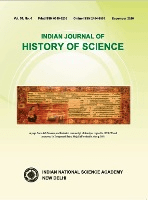
INDIAN JOURNAL OF HISTORY OF SCIENCE
Illuminating India's Scientific Journey Through TimeINDIAN JOURNAL OF HISTORY OF SCIENCE, published by the Indian National Science Academy, offers a vital platform for researchers, professionals, and students dedicated to the exploration of the historical development of science and technology in India and beyond. With the ISSN 0019-5235 and E-ISSN 2454-9991, this peer-reviewed journal aims to promote interdisciplinary collaboration by publishing original research articles, reviews, and discussion papers that highlight the contributions and evolution of scientific thought throughout history. The journal fosters a unique understanding of how historical contexts have shaped current scientific paradigms, making it an essential resource for academic inquiry. Although it does not currently offer Open Access options, the journal's rigorous editorial standards ensure that it maintains a significant impact within the scholarly community, serving as a crucial reference point for historical scholarship in the sciences. Its address in Bahadur Shah Zafar Marg, New Delhi 110 002, India, situates it within a rich tapestry of cultural and academic heritage, further enhancing its significance in the field.
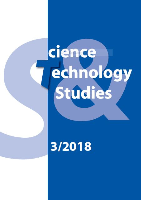
Science and Technology Studies
Pioneering Critical Analyses for a Complex WorldScience and Technology Studies, an esteemed journal published by the Finnish Society for Social Science & Technology Studies, is a leading platform in the fields of History and Philosophy of Science, as well as Multidisciplinary studies. Since transitioning to an Open Access model in 2012, the journal has been committed to disseminating high-quality research accessible to a global audience, fostering international discourse and collaboration. With an impressive Scopus ranking placing it in the top 10th percentile (Rank #22 out of 223) within its categories, it showcases pioneering research and critical analyses that illuminate the complex interplay between science and societal dynamics. Located in Tampere, Finland, the journal serves as an essential resource for researchers, professionals, and students alike, aiming to advance understanding and innovation in science and technology studies through interdisciplinary engagement.

History of Geo- and Space Sciences
Bridging the gap between history, philosophy, and geo-sciences.History of Geo- and Space Sciences is a distinguished open-access journal published by COPERNICUS GESELLSCHAFT MBH since 2010, committed to advancing knowledge in the interdisciplinary fields of Earth and planetary sciences as well as the history and philosophy of science. Based in Germany, this journal operates under ISSN 2190-5010 and E-ISSN 2190-5029, providing a platform for researchers, professionals, and students to disseminate and access high-quality scholarly articles. With a remarkable impact reflected in its 2023 Scopus rankings, placing it in Q3 for Earth and Planetary Sciences (miscellaneous) and Q2 for History and Philosophy of Science, the journal plays a crucial role in fostering dialogue and collaboration among the scientific community. It not only covers significant advancements in geo-sciences but also addresses historical perspectives and philosophical inquiries that shape our understanding of the discipline. Engage with groundbreaking research and broaden your insights by contributing to or reading articles from this pivotal journal.

Metode Science Studies Journal
Unlocking the Complexities of Scientific PracticesMetode Science Studies Journal, published by UNIV VALENCIA, BOTANICAL GARDEN UV, is an esteemed open-access journal dedicated to advancing scholarly discourse in the fields of history and philosophy of science and multidisciplinary studies. Since its inception in 2013, the journal has positioned itself as a vital resource for researchers, professionals, and students, fostering an environment for innovative research and cross-disciplinary dialogue. Based in the vibrant city of Valencia, Spain, this journal aims to publish high-quality articles that explore the intricate relationships between scientific practices and philosophical inquiries. With a current impact factor demonstrating its relevance in the academic community, the journal is indexed in Scopus, ranking in the 52nd percentile for history and philosophy of science and the 33rd percentile for multidisciplinary studies. Scholars can access a breadth of research outputs that span from 2015 to 2024, thereby contributing significantly to the intellectual landscape of the respective fields.